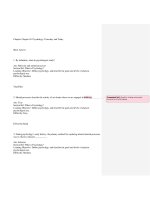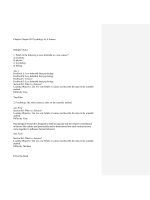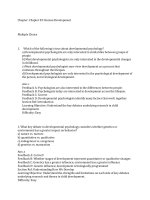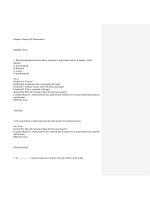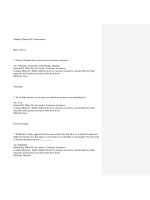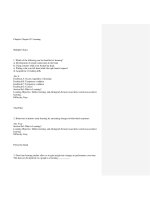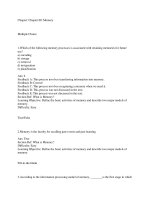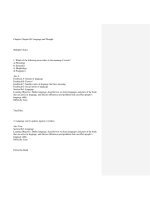TestBank psychology around us 2nd edition comer ch02
Bạn đang xem bản rút gọn của tài liệu. Xem và tải ngay bản đầy đủ của tài liệu tại đây (636.5 KB, 93 trang )
Chapter: Chapter 02: Psychology As A Science
Multiple Choice
1. Which of the following is most debatable as a true science?
a) chemistry
b) physics
c) psychology
d) biology
Ans: c
Feedback A: Less debatable than psychology
Feedback B: Less debatable than psychology
Feedback C: Correct!
Feedback D: Less debatable than psychology
Section Ref: What is a Science?
Learning Objective: List two core beliefs of science and describe the steps in the scientific
method.
Difficulty: Easy
True/False
2. Psychology, like other sciences, relies on the scientific method.
Ans: True
Section Ref: What is a Science?
Learning Objective: List two core beliefs of science and describe the steps in the scientific
method.
Difficulty: Easy
Psychological research is designed to both to separate out the relative contribution
of factors like culture and personality and to think about how such various factors
come together to influence human behavior.
Ans: True
Section Ref: What is a Science?
Learning Objective: List two core beliefs of science and describe the steps in the scientific
method.
Difficulty: Medium
Fill-in-the-blank
3. The natural law of __________ suggests that when something is set in motion, it has an effect
on other things.
Ans: cause and effect
Section Ref: What is a Science?
Learning Objective: List two core beliefs of science and describe the steps in the scientific
method.
Difficulty: Medium
Short Answer
4. What logical process starts with broad, basic principles and applies them in specific situations
to prove many smaller truths?
Ans: Deductive reasoning
Section Ref: What is a Science?
Learning Objective: List two core beliefs of science and describe the steps in the scientific
method.
Difficulty: Hard
Essay
5. What are the two essential beliefs that science has regarding the world?
Ans: The universe operates according to natural laws and that such laws are discoverable and
testable.
Section Ref: What is a Science?
Learning Objective: List two core beliefs of science and describe the steps in the scientific
method.
Difficulty: Hard
Multiple Choice
6. What British philosopher argued against the use of deductive reasoning because he believed it
was too susceptible to thinkers’ biases?
a) Skinner
b) Popper
c) Kant
d) Baker
Ans: d
Feedback A: Recognized that many of the processes that form the basis of psychology cannot be
observed or described directly
Feedback B: Argued that a sound scientific theory must establish, in advance, observations that
would refute it
Feedback C: Suggested that psychology is indeed empirical and very close to a “real” science
Feedback D: Correct!
Section Ref: What is a Science?
Learning Objective: List two core beliefs of science and describe the steps in the scientific
method.
Difficulty: Medium
True/False
7. If individuals carefully observe the events in the world around them, they are often able to
discover the laws that govern those events.
Ans: True
Section Ref: What is a Science?
Learning Objective: List two core beliefs of science and describe the steps in the scientific
method.
Difficulty: Medium
Short Answer
8. What term refers to personal beliefs or conventional wisdom that a particular thinker accepts
as a broad, basic truth?
Ans: Bias
Section Ref: What is a Science?
Learning Objective: List two core beliefs of science and describe the steps in the scientific
method.
Difficulty: Medium
Short Answer
9. What logical process uses direct observations to generate broad conclusions?
Ans: Inductive reasoning
Section Ref: What is a Science?
Learning Objective: List two core beliefs of science and describe the steps in the scientific
method.
Difficulty: Hard
Essay
10. Define the term “hypothesis” and provide an example.
Ans: A hypothesis is a testable statement that can objectively be proven false. Hypotheses are
typically in the form of an if/then statement; applicable example must be provided
Section Ref: What is a Science?
Learning Objective: List two core beliefs of science and describe the steps in the scientific
method.
Difficulty: Hard
Multiple Choice
11. Observations of behaviors or any other events must be objectively testable. Which of the
following does not meet this criterion?
a) dollars spent in a department store
b) number of students in a school
c) frequency of reported car accidents
d) number of caring people in the world
Ans: d
Feedback A: Observable/measurable
Feedback B: Observable/measurable
Feedback C: Observable/measurable
Feedback D: Correct!
Section Ref: What is a Science?
Learning Objective: List two core beliefs of science and describe the steps in the scientific
method.
Difficulty: Easy
True/False
12. Theories are the product of deductive reasoning.
Ans: False
Feedback: Product of inductive reasoning
Section Ref: What is a Science?
Learning Objective: List two core beliefs of science and describe the steps in the scientific
method.
Difficulty: Hard
Fill-in-the-blank
13. Ideas that psychologists develop about the laws that govern processes and behavior are called
___________.
Ans: theories
Section Ref: What is a Science?
Learning Objective: List two core beliefs of science and describe the steps in the scientific
method.
Difficulty: Medium
Short Answer
14. What blended model is commonly used by psychologists to employ the best attributes of
deductive and inductive reasoning?
Ans: Hypothetico-deductive approach
Section Ref: What is a Science?
Learning Objective: List two core beliefs of science and describe the steps in the scientific
method.
Difficulty: Hard
Essay
15. Describe the four steps used in the scientific approach to study behavior.
Ans: Making observations, developing a hypothesis, testing the hypothesis, and developing a
theory
Section Ref: What is a Science?
Learning Objective: List two core beliefs of science and describe the steps in the scientific
method.
Difficulty: Hard
Multiple Choice
16. A given field of study is defined as a science by virtue of its:
a) methods
b) equipment
c) subject matter
d) findings
Ans: a
Feedback A: Correct!
Feedback B: Incorrect. A field is defined as a science by its use of the scientific method.
Feedback C: Incorrect. A field is defined as a science by its use of the scientific method.
Feedback D: Incorrect. A field is defined as a science by its use of the scientific method.
Section Ref: What is a Science?
Learning Objective: List two core beliefs of science, and describe the steps in the scientific
method.
Difficulty Level: Easy
17. “Psychology is not a science,” Adam argues. Which of the following is the BEST
argument opposing this claim?
a) Psychology is a science because it uses sophisticated technology in its research.
b) Psychology is a science because some of its early contributors were physiologists.
c) Psychology is a science because of the methods it uses.
d) Psychology is a science because it studies the brain and the rest of the nervous system.
Ans: c
Feedback A: Incorrect. Psychology is a science because it uses the scientific method, not
because it uses sophisticated technology in its research.
Feedback B: Incorrect. Psychology is a science because it uses the scientific method, not
because of its historical roots in physiology.
Feedback C: Correct!
Feedback D: Incorrect. Psychology is a science because it uses the scientific method, not
because it studies the nervous system.
Section Ref: What is a Science?
Learning Objective: List two core beliefs of science, and describe the steps in the scientific
method.
Difficulty Level: Medium
18. Which of the following adjectives would a scientist use most readily in describing the
universe?
a) mysterious
b) lawful
c) simple
d) chaotic
Ans: b
Feedback A: Incorrect. Scientists view the universe as fundamentally lawful.
Feedback B: Correct!
Feedback C: Incorrect. Scientists view the universe as fundamentally lawful, but not
necessarily simple.
Feedback D: Incorrect. Scientists view the universe as fundamentally lawful.
Section Ref: What is a Science?
Learning Objective: List two core beliefs of science, and describe the steps in the scientific
method.
Difficulty Level: Easy
20. Dr. Arceneaux is a meteorologist. Dr. Bianchini is a psychologist. With which of the
following statements would they most likely agree?
a) Like the weather, human behavior is inherently unpredictable.
b) The weather is predictable. Human behavior is not.
c) While the weather is unpredictable, human behavior is predictable.
d) Both the weather and human behavior are ultimately predictable.
Ans: d
Feedback A: Incorrect. Drs. Arceneaux and Bianchini would argue that both the weather and
human behavior are predictable, rather than unpredictable.
Feedback B: Incorrect. Drs. Arceneaux and Bianchini would argue that both the weather and
human behavior are predictable.
Feedback C: Incorrect. Drs. Arceneaux and Bianchini would argue that both the weather and
human behavior are predictable.
Feedback D: Correct!
Section Ref: What is a Science?
Learning Objective: List two core beliefs of science, and describe the steps in the scientific
method.
Difficulty Level: Medium
21. The Greek philosophers used a type of reasoning known as ______ reasoning.
a) deductive
b) hypothetico-deductive
c) Socratic
d) inductive
Ans: a
Feedback A: Correct!
Feedback B: Incorrect. The Greek philosophers relied on deductive reasoning, not
hypothetico-deductive reasoning.
Feedback C: Incorrect. The Greek philosophers relied on deductive reasoning. The term
“Socratic” is not used to refer to a type of reasoning.
Feedback D: Incorrect. The Greek philosophers relied on deductive reasoning, not inductive
reasoning.
Section Ref: What is a Science?
Learning Objective: List two core beliefs of science, and describe the steps in the scientific
method.
Difficulty Level: Easy
22. Why did the Renaissance philosopher Francis Bacon question the validity of deductive
reasoning? Which type of reasoning did he suggest as an alternative?
a) Bacon believed that deductive reasoning was prone to biases. He suggested
hypothetico-deductive reasoning as an alternative.
b) Bacon believed that deductive reasoning was prone to biases. He suggested inductive
reasoning as an alternative.
c) Bacon believed that deductive reasoning often failed to result in general theories. He
suggested hypothetico-deductive reasoning as an alternative.
d) Bacon believed that deductive reasoning often failed to result in general theories. He
suggested inductive reasoning as an alternative.
Ans: b
Feedback A: Incorrect. Bacon suggested inductive reasoning, not hypothetico-deductive
reasoning as an alternative to deductive reasoning.
Feedback B: Correct!
Feedback C: Incorrect. Bacon believed that deductive reasoning was prone to biases, not that
it failed to result in general theories. He suggested inductive reasoning, not
hypothetico-deductive reasoning as an alternative to deductive reasoning.
Feedback D: Incorrect. Bacon believed that deductive reasoning was prone to biases, not that
it failed to result in general theories.
Section Ref: What is a Science?
Learning Objective: List two core beliefs of science, and describe the steps in the scientific
method.
Difficulty Level: Hard
23. Cecilia is using the formula F = M*A to solve a physics problem. Cecilia is using ______
reasoning.
a) hypothetico-deductive
b) empirical
c) inductive
d) deductive
Ans: d
Feedback A: Incorrect. Using a general formula to solve a specific problem exemplifies
deductive, not hypothetico-deductive, reasoning.
Feedback B: Incorrect. Using a general formula to solve a specific problem exemplifies
deductive reasoning. “Empirical” is not a term used to identify a type of reasoning.
Feedback C: Incorrect. Using a general formula to solve a specific problem exemplifies
deductive, not inductive, reasoning.
Feedback D: Correct!
Section Ref: What is a Science?
Learning Objective: List two core beliefs of science, and describe the steps in the scientific
method.
Difficulty Level: Medium
24. Why might one argue that inductive reasoning is less susceptible to bias than deductive
reasoning is?
a) Inductive reasoning begins with a general theory rather than specific observations.
b) In inductive reasoning, the observations that would refute the theory are specified in advance.
c) Inductive reasoning begins with objective observations rather than a theory in the reasoner’s
mind.
d) Inductive reasoning is essentially the opposite of the sort of deductive reasoning that
philosophers used.
Ans: c
Feedback A: Incorrect. Inductive reasoning may be less prone to bias because it begins with
objective observations rather than a theory in the reasoner’s mind. It is deductive reasoning that
begins with a general theory.
Feedback B: Incorrect. Inductive reasoning may be less prone to bias because it begins with
objective observations rather than a theory in the reasoner’s mind. It is hypothetico-deductive
reasoning that specifies contradicting observations in advance.
Feedback C: Correct!
Feedback D: Incorrect. Inductive reasoning may be less prone to bias because it begins with
objective observations rather than a theory in the reasoner’s mind.
Section Ref: What is a Science?
Learning Objective: List two core beliefs of science, and describe the steps in the scientific
method.
Difficulty Level: Hard
25. Recall your text’s discussion of the behaviorist perspective in Chapter 1. According to
your text, “Skinner argued [that] empirical – observable – information should be gathered first,
and then theories . . . could be formulated from that.” Skinner is endorsing _____ reasoning,
promoted early on by _______.
a) inductive; Bacon
b) inductive; Descartes
c) deductive; Bacon
d) deductive; Descartes
Ans: a
Feedback A: Correct!
Feedback B: Incorrect. Inductive reasoning was promoted by Bacon, not Descartes.
Feedback C: Incorrect. Inductive, not deductive, reasoning proceeds from observation to
theory.
Feedback D: Incorrect. Inductive, not deductive, reasoning proceeds from observation to
theory. Inductive reasoning was promoted by Bacon, not Descartes.
Section Ref: What is a Science?
Learning Objective: List two core beliefs of science, and describe the steps in the scientific
method.
Difficulty Level: Medium
26. Why does contemporary psychology no longer rely solely on inductive reasoning?
a) Inductive reasoning is too susceptible to the biases of the individual psychologist.
b) Inductive reasoning is not based on objective observation.
c) There are so many factors influencing human behavior that pure induction could never
identify them all.
d) Inductive reasoning never proved a successful way of gaining knowledge.
Ans: c
Feedback A: Incorrect. There are too many factors influencing human behavior for induction
to be an efficient way of generating knowledge. Inductive reasoning is less susceptible bias
than is deductive reasoning.
Feedback B: Incorrect. There are too many factors influencing human behavior for induction
to be an efficient way of generating knowledge. Inductive reasoning is based on objective
observation.
Feedback C: Correct!
Feedback D: Incorrect. There are too many factors influencing human behavior for induction
to be an efficient way of generating knowledge. Some psychologists, such as Skinner, have
used induction successfully.
Section Ref: What is a Science?
Learning Objective: List two core beliefs of science, and describe the steps in the scientific
method.
Difficulty Level: Hard
27. Most psychologists today use a type of reasoning termed ________ reasoning.
a) theoretico-inductive
b) theoretico-deductive
c) hypothetico-inductive
d) hypothetico-deductive
Ans: d
Feedback A: Incorrect. The type of reasoning prevalent in psychology today is termed
“hypothetico-deductive” reasoning.
Feedback B: Incorrect. The type of reasoning prevalent in psychology today is termed
“hypothetico-deductive” reasoning.
Feedback C: Incorrect. The type of reasoning prevalent in psychology today is termed
“hypothetico-deductive” reasoning.
Feedback D: Correct!
Section Ref: What is a Science?
Learning Objective: List two core beliefs of science, and describe the steps in the scientific
method.
Difficulty Level: Easy
28. A statement of the objective relationship between two variables is termed a(n) _______.
a) axiom
b) law
c) theory
d) hypothesis
Ans: d
Feedback A: Incorrect. A statement of the objective relationship between two variables is a
hypothesis, not an axiom.
Feedback B: Incorrect. A statement of the objective relationship between two variables is a
hypothesis, not a law.
Feedback C: Incorrect. A statement of the objective relationship between two variables is a
hypothesis, not a hypothesis.
Feedback D: Correct!
Section Ref: What is a Science?
Learning Objective: List two core beliefs of science, and describe the steps in the scientific
method.
Difficulty Level: Easy
29. Which statement below is MOST consistent with the hypothetico-deductive approach to
reasoning?
a) Hypotheses are deduced from theories.
b) Hypotheses are induced from theories.
c) Theories are deduced from hypotheses.
d) Theories are induced from observations.
Ans: a
Feedback A: Correct!
Feedback B: Incorrect. In hypothetico-deductive reasoning, hypotheses are deduced, not
induced from theories.
Feedback C: Incorrect. In hypothetico-deductive reasoning, hypotheses are deduced from
theories. Theories are not deduced from hypotheses.
Feedback D: Incorrect. In hypothetico-deductive reasoning, hypotheses are deduced from
theories. Theories are induced from observations in inductive reasoning.
Section Ref: What is a Science?
Learning Objective: List two core beliefs of science, and describe the steps in the scientific
method.
Difficulty Level: Hard
30. Which of the following alternatives CORRECTLY identifies the order in which the goals of
science are pursued using a given type of reasoning?
a) deductive reasoning: observation prediction explanation
b) hypothetico-deductive reasoning: prediction observation explanation
c) hypothetico-deductive reasoning: observation prediction explanation
d) inductive reasoning: explanation prediction observation
Ans: b
Feedback A: Incorrect. Deductive reasoning begins with a theory or explanation, rather than
with observations.
Feedback B: Correct!
Feedback C: Incorrect. Hypothetico-deductive reasoning begins with a hypothesis, or
prediction, rather than with observations.
Feedback D: Incorrect. Inductive reasoning begins with observations, rather than with a theory
or explanation.
Section Ref: What is a Science?
Learning Objective: List two core beliefs of science, and describe the steps in the scientific
method.
Difficulty Level: Hard
31. You are at the annual conference of the Association for Psychological Science, listening to
researchers present papers on social development in later adulthood. In her presentation, Dr.
Dryer notes, “Social disengagement theory predicts that older adults will attend social events less
often than will middle-aged adults.” The next presenter, Dr. Ebrahimi, reports that in the diaries
participants kept as part of his study, older adults reported attending just as many parties,
dinners, or other informal gatherings as did middle-aged adults, casting doubt on social
disengagement theory. Dr. Dryer’s statement reflects the _______ component of
hypothetico-deductive reasoning, whereas Dr. Ebrahimi’s illustrates _______.
a) inductive; the inductive component also
b) inductive; the deductive component
c) deductive; the inductive component
d) deductive; the deductive component also
Ans: c
Feedback A: Incorrect. Dr. Dryer is deducing a hypothesis from a theory, reflecting the
deductive rather than the inductive component of hypothetico-deductive reasoning.
Feedback B: Incorrect. Dr. Dryer is deducing a hypothesis from a theory, reflecting the
deductive rather than the inductive component of hypothetico-deductive reasoning. Dr.
Ebrahimi is using observations to evaluate theory, illustrating the inductive component.
Feedback C: Correct!
Feedback D: Incorrect. Dr. Ebrahimi is using observations to evaluate theory, illustrating the
inductive component of hypothetico-deductive reasoning.
Section Ref: What is a Science?
Learning Objective: List two core beliefs of science, and describe the steps in the scientific
method.
Difficulty Level: Medium
32. The frustration-aggression hypothesis predicts that aggressive behavior follows the failure
to attain a goal. The hypothesis is supported when an individual hits and curses at a vending
machine that fails to deliver a cold drink after money has been inserted. This scenario illustrates
the ________ reasoning process.
a) reductive
b) deductive
c) inductive
d) hypothetico-deductive
Ans: d
Feedback A: Incorrect. The scenario illustrates the hypothetico-deductive method because it
describes a hypothesis predicting observations. “Reductive” is not a term used to describe a
type of reasoning.
Feedback B: Incorrect. The scenario illustrates the hypothetico-deductive method because it
describes a hypothesis predicting observations. Deduction entails deriving a conclusion from a
general theory.
Feedback C: Incorrect. The scenario illustrates the hypothetico-deductive method because it
describes a hypothesis predicting observations. Induction involves building theory based on
observations.
Feedback D: Correct!
Section Ref: What is a Science?
Learning Objective: List two core beliefs of science, and describe the steps in the scientific
method.
Difficulty Level: Easy
In the 1620s Francis Bacon conducted an experiment about the effects of __________.
a) sensation on memory
b) unconscious drives on aggression.
c) freezing on food preservation
d) sleep on self-esteem
Ans: c
Feedback A: Bacon studied the effects of freezing on food preservation.
Feedback B: Bacon studied the effects of freezing on food preservation.
Feedback C: Correct!
Feedback D: Bacon studied the effects of freezing on food preservation.
Section Ref: What is a Science?
Learning Objective: List two core beliefs of science and describe the steps in the scientific
method.
Difficulty: Easy
In the 1620s Francis Bacon was interested in studying the effects of freezing on food
preservation. What research method did he use to conduct his study?
a) The experimental method
b) The correlational method
c) The naturalistic observation method
d) The introspection method
Ans: a
Feedback A: Correct!
Feedback B: Bacon used the experimental method.
Feedback C: Bacon used the experimental method.
Feedback D: Bacon used the experimental method.
Section Ref: What is a Science?
Learning Objective: List two core beliefs of science and describe the steps in the scientific
method.
Difficulty: Medium
Which of the following research methods involves manipulation of an independent
variable and random assignment to conditions?
a) The introspection method
b) The correlational method
c) Naturalistic observation
d) The experimental method
Ans: d
Feedback A: The introspection method does not involve the manipulation of an independent
variable or random assignment to conditions
Feedback B: The correlational method does not involve the manipulation of an independent
variable or random assignment to conditions
Feedback C: The naturalistic observation method does not involve the manipulation of an
independent variable or random assignment to conditions
Feedback D: Correct!
Section Ref: What is a Science?
Learning Objective: List two core beliefs of science and describe the steps in the scientific
method.
Difficulty: Medium
33. Prior to the nineteenth century, which field contributed most to the rise of psychology?
a) philosophy
b) chemistry
c) biology
d) physics
Ans: a
Feedback A: Correct!
Feedback B: This field had an impact at a later date.
Feedback C: This field had an impact at a later date.
Feedback D: This field had an impact at a later date.
Section Ref: Is Psychology Science?
Learning Objective: Compare and contrast psychology with other natural sciences, such as
biology, chemistry, and physics, and with pseudopsychologies such as astrology.
Difficulty: Medium
True/False
34. Religion and mysticism were not early influences on the development of psychology as a
discipline.
Ans: False
Feedback: They were early influences.
Section Ref: Is Psychology Science?
Learning Objective: Compare and contrast psychology with other natural sciences, such as
biology, chemistry, and physics, and with pseudopsychologies such as astrology.
Difficulty: Medium
Fill-in-the-blank
35. The field of __________ is often credited with shifting psychology from a philosophy to a
science.
Ans: biology
Section Ref: Is Psychology Science?
Learning Objective: Compare and contrast psychology with other natural sciences, such as
biology, chemistry, and physics, and with pseudopsychologies such as astrology.
Difficulty: Hard
Short Answer
36. What 4 goals does psychology share with other sciences?
Ans: Describe, explain, predict, control
Section Ref: Is Psychology Science?
Learning Objective: Compare and contrast psychology with other natural sciences, such as
biology, chemistry, and physics, and with pseudopsychologies such as astrology.
Difficulty: Hard
Essay
37. Describe a key difference between the goals of psychology and the physical sciences.
Ans: Although psychologists attempt to isolate the fundamental elements of behavior, they
realize that these factors may be temporary or permanent combinations that vary by individual.
Psychology also differs from the physical sciences in terms of how it pursues scientific goals and
in its ability to influence personal and social values.
Section Ref: Is Psychology Science?
Learning Objective: Compare and contrast psychology with other natural sciences, such as
biology, chemistry, and physics, and with pseudopsychologies such as astrology.
Difficulty: Hard
Multiple Choice
38. Which approach to psychology advocated focus on observable behaviors only?
a) hypothetico-deductive
b) inductive reasoning
c) pseudopsychology
d) behaviorism
Ans: d
Feedback A: Blended model of deductive and inductive reasoning approaches
Feedback B: Uses controlled direct observations to generate broad conclusions
Feedback C: Argues that psychological principles can provide answer to all major questions
Feedback D: Correct!
Section Ref: Is Psychology Science?
Learning Objective: Compare and contrast psychology with other natural sciences, such as
biology, chemistry, and physics, and with pseudopsychologies such as astrology.
Difficulty: Easy
_________ is considered a psuedopsychology.
a) Forensics
b) Astrology
c) Medicine
d) Anthropology
Ans: b
Feedback A: Forensics is considered a science.
Feedback B: Correct!
Feedback C: Medicine is considered a science.
Feedback D: Anthropology is considered a science.
Section Ref: Is Psychology Science?
Learning Objective: Compare and contrast psychology with other natural sciences, such as
biology, chemistry, and physics, and with pseudopsychologies such as astrology.
Difficulty: Medium
True/False
39. Kant argued that psychology is not a “real” science.
Ans: False
Feedback: Suggested that psychology is indeed empirical and very close to a “real” science
Section Ref: Is Psychology Science?
Learning Objective: Compare and contrast psychology with other natural sciences, such as
biology, chemistry, and physics, and with pseudopsychologies such as astrology.
Difficulty: Medium
Fill-in-the-blank
40. Forced sterilization and controlled breeding are two consequences of __________.
Ans: eugenics
Section Ref: Is Psychology Science?
Learning Objective: Compare and contrast psychology with other natural sciences, such as
biology, chemistry, and physics, and with pseudopsychologies such as astrology.
Difficulty: Hard
Short Answer
41. Psychology distinguishes itself from other scientific fields by examining what 3 issues?
Ans: Values, morality, and personal preference
Section Ref: Is Psychology Science?
Learning Objective: Compare and contrast psychology with other natural sciences, such as
biology, chemistry, and physics, and with pseudopsychologies such as astrology.
Difficulty: Hard
Essay
42. What is the difference between psychology and pseudopsychology?
Ans: Pseudopsychology argues that psychological principles can provide answers to all of life’s
major questions; has no basis in the scientific method
Section Ref: Is Psychology Science?
Learning Objective: Compare and contrast psychology with other natural sciences, such as
biology, chemistry, and physics, and with pseudopsychologies such as astrology.
Difficulty: Medium
True-False
6. Psuedopsychology is based on the scientific method.
Ans: False
Section Ref: Is Psychology Science?
Learning Objective: Compare and contrast psychology with other natural sciences, such as
biology, chemistry, and physics, and with pseudopsychologies such as astrology.
Difficulty: Easy
Essay
Why is astrology considered to be psuedopsychology?
Ans: According to astrologists, an individual’s personality traits are based on the
alignment of planets on the date of their birth. Most of the claims of astrology cannot
be scientifically tested. Those few that have been tested have not received empirical
support. Although the terms and tests used in astrology bear some resemblance to
psychological personality tests, the claims of astrology have no scientific basis.
Section Ref: Is Psychology Science?
Learning Objective: Compare and contrast psychology with other natural sciences, such as
biology, chemistry, and physics, and with pseudopsychologies such as astrology.
Difficulty: Hard
Multiple Choice
43. Which of the following is an example of pseudopsychology?
a) astronomy
b) astrology
c) Gestalt
d) Maharishi
Ans: b
Feedback A: Physical science
Feedback B: Correct!
Feedback C: Psychological principle
Feedback D: Type of religion
Section Ref: Is Psychology Science?
Learning Objective: Compare and contrast psychology with other natural sciences, such as
biology, chemistry, and physics, and with pseudopsychologies such as astrology.
Difficulty: Medium
True/False
44. Psychology does not provide the means to answer all of life’s major questions.
Ans: True
Section Ref: Is Psychology Science?
Learning Objective: Compare and contrast psychology with other natural sciences, such as
biology, chemistry, and physics, and with pseudopsychologies such as astrology.
Difficulty: Medium
Multiple Choice
45. Which science uses Zodiac signs to predict the future and provide advice about relationships?
a) astrology
b) astronomy
c) Gestalt
d) Maharishi
Ans: Astrology
Feedback A: Correct!
Feedback B: Physical science
Feedback C: Psychological principle
Feedback D: Type of religion
Section Ref: Is Psychology Science?
Learning Objective: Compare and contrast psychology with other natural sciences, such as
biology, chemistry, and physics, and with pseudopsychologies such as astrology.
Difficulty: Easy
Short Answer
46. What is the guiding principle of astrology?
Ans: Human personality traits are based on the alignment of the planets on given birth dates, and
these traits determine how people make decisions and interact with others.
Section Ref: Is Psychology Science?
Learning Objective: Compare and contrast psychology with other natural sciences, such as
biology, chemistry, and physics, and with pseudopsychologies such as astrology.
Difficulty: Hard
Essay
47. What difficult balance, in regards to using psychology and pseudopsychology, must
psychologists maintain?
Ans: They must encourage people to seek guidance for how to live effectively while
simultaneously distancing themselves from the non-scientific approaches used by
pseudopsychology.
Section Ref: Is Psychology Science?
Learning Objective: Compare and contrast psychology with other natural sciences, such as
biology, chemistry, and physics, and with pseudopsychologies such as astrology.
Difficulty: Hard
Multiple Choice
48. In which century did psychology move from a field based on philosophy and religion to one
based on science?
a) the 17th century
b) the 18th century
c) the 19th century
d) the 20th century
Ans: c
Feedback A: Incorrect. Psychology became a science in the 19th, not the 17th, century.
Feedback B: Incorrect. Psychology became a science in the 19th, not the 18th, century.
Feedback C: Correct!
Feedback D: Incorrect. Psychology became a science in the 19th, not the 20th, century.
Section Ref: Is Psychology Science?
Learning Objective: Compare and contrast psychology with other natural sciences, such as
biology, chemistry, and physics, and with pseudosciences, such as astrology.
Difficulty Level: Easy
49. Which discipline is credited with transforming psychology from a philosophical field to a
scientific one?
a) biology
b) chemistry
c) physics
d) mathematics
Ans: a
Feedback A: Correct!
Feedback B: Incorrect. Biology, not chemistry, is credited with transforming psychology from
a philosophical field to a scientific one.
Feedback C: Incorrect. Biology, not physics, is credited with transforming psychology from a
philosophical field to a scientific one.
Feedback D: Incorrect. Biology, not mathematics, is credited with transforming psychology
from a philosophical field to a scientific one.
Section Ref: Is Psychology Science?
Learning Objective: Compare and contrast psychology with other natural sciences, such as
biology, chemistry, and physics, and with pseudosciences, such as astrology.
Difficulty Level: Easy
50. Which of the following statements best expresses the relationship between psychology and
such natural sciences as biology?
a) Psychology is the same as any other natural science.
b) Psychology pursues different goals and uses different methods than do such natural sciences
as biology.
c) Psychology is unlikely ever to become a true natural science.
d) Psychology differs in some ways from the other natural sciences.
Ans: d
Feedback A: Incorrect. Psychology differs from other natural sciences in the way that it
pursues some of its goals and in its relationship to personal and social values.
Feedback B: Incorrect. Psychology uses the same scientific method found in other fields. It
differs from other natural sciences in the way that it pursues some of its goals and in its
relationship to personal and social values.
Feedback C: Incorrect. Psychology is a true natural science. It differs from other natural
sciences in the way that it pursues some of its goals and in its relationship to personal and social
values.
Feedback D: Correct!
Section Ref: Is Psychology Science?
Learning Objective: Compare and contrast psychology with other natural sciences, such as
biology, chemistry, and physics, and with pseudosciences, such as astrology.
Difficulty Level: Medium
51. According to your text, which scientific goal seems to pose a particular challenge for
psychology?
a) description
b) prediction
c) explanation
d) control
Ans: a
Feedback A: Correct!
Feedback B: Incorrect. Your text suggests that description, especially, is challenging for
psychologists because of the many factors that influence behavior and because many
psychological concepts are not directly observable.
Feedback C: Incorrect. Your text suggests that description, especially, is challenging for
psychologists because of the many factors that influence behavior and because many
psychological concepts are not directly observable.
Feedback D: Incorrect. Your text suggests that description, especially, is challenging for
psychologists because of the many factors that influence behavior and because many
psychological concepts are not directly observable.
Section Ref: Is Psychology Science?
Learning Objective: Compare and contrast psychology with other natural sciences, such as
biology, chemistry, and physics, and with pseudosciences, such as astrology.
Difficulty Level: Easy
52. “The process of observation is a challenging one for psychology, given its subject
matter,”offers Frederico. “That’s why psychology should investigate only phenomena which
are clearly observable,” Grady responds. “But psychologists can use observable behavior to
make reliable statements about internal processes that can’t be seen,” counters Holly. “Not to
mention, technology continues to expand the range of psychological processes we can actually
observe,” Indira notes. Which of these discussants is paired with the psychological perspective
they most clearly reflect?
a) Grady – psychodynamic perspective
b) Holly – behaviorist perspective
c) Indira – neuroscience perspective
d) Grady – cognitive perspective
Ans: c
Feedback A: Incorrect. Grady’s belief that psychology should investigate only observable
phenomena reflects the behaviorist rather than the psychodynamic perspective.
Feedback B: Incorrect. Holly’s contention that psychologists can use observable behavior to
make statements about internal processes does not reflect the behaviorist position. Behaviorists
believed that psychology should examine only observable phenomena.
Feedback C: Correct!
Feedback D: Incorrect. Grady’s belief that psychology should investigate only observable
phenomena reflects the behaviorist rather than the cognitive perspective.
Section Ref: Is Psychology Science?
Learning Objective: Compare and contrast psychology with other natural sciences, such as
biology, chemistry, and physics, and with pseudosciences, such as astrology.
Difficulty Level: Hard
53. Recall the levels of analysis described in Ch. 1 of your text. If you were sympathetic to the
notion that psychology should limit itself to clearly observable phenomena, on which level of
analysis might you concentrate?
a) the brain level
b) the individual level
c) the group level
d) the social level
Ans: a
Feedback A: Correct!
Feedback B: Incorrect. Many individual-level variables, such as personality traits, are not
directly observable. Brain-level variables have a clear, physical reality and are becoming
observable through imaging and other technologies.
Feedback C: Incorrect. Many group-level variables, such as a culture’s collectivism, are not
directly observable. Brain-level variables have a clear, physical reality and are becoming
observable through imaging and other technologies.
Feedback D: Incorrect. Many social – or group-level – variables, such as a culture’s
collectivism, are not concrete or directly observable. Brain-level variables have a clear,
physical reality and are becoming observable through imaging and other technologies.
Section Ref: Is Psychology Science?
Learning Objective: Compare and contrast psychology with other natural sciences, such as

